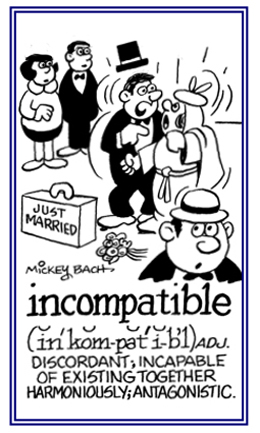pass-, pati-
(Latin: suffering, feeling; enduring)
2. Contrariness in character; discordancy: Susan wanted to avoid an incompatibility of colors in her living room.
3. That which cannot coexist or be conjoined: Tom was aware of the incompatibility of long hours at work and his family life.
4. The quality of biological substances that interfere with one another physiologically: Dr. Smart said that, because of the incompatibility of the two types of blood, it wasn't possible to use the donors blood in the transfusion for Mrs. Long.
5. In pharmacology the incongruity of drugs in which they interfere with one another chemically or physiologically: Because of the incompatibility of the two medicines, Dr. Thompson said that they could not be mixed or prescribed together.
A little incompatibility is the spice of life, particularly if he has income and she is pattable.
Joe bought a new piece of hardware for his computer, but it didn't work because it was incompatible with his own computer system.

Go to this Word A Day Revisited Index
so you can see more of Mickey Bach's cartoons.
Being incompatible is when a man wants a divorce and his wife doesn’t, or when the husband loses his income and the wife her patability.
In Genesis (the first book in the Bible) it says that it is not good for a man to be alone, but sometimes it is a great relief.
2. The incapability of associating or blending, or of being associated or blended because of inharmoniousness or incongruity: It was incompatibly difficult to get the two computer programs coordinated.
- Great anger, rage, or fury; a crime that is motivated by an extreme emotion, especially sexual jealousy: The crime was committed in a fit of passion, also termed as a crime of passion.
- Enthusiasm or fondness for; something a person enjoys or loves doing very much: Writing has always been Floyd's passion.
- Strong love or affection; craze, mania: She spoke with passion about preserving the building.
- Amorous feelings; strong sexual affection, sexual drive, or desire; love; lust: Stella never felt such passion for anyone except for Max.
Every civilization is, among other things, an arrangement for domesticating the passions and settling them to do useful work.
Asthma is a disease that has practically the same symptoms as passion, except that with asthma it lasts longer.
If we resist our passions, it is more from their weakness than from our strength.
Passions are vices or virtues in their highest powers.
2. Concerning an individual who is easily angered; hot-tempered: James seemed to be a wrathful, passionate, and choleric man and consequently didn't have any friends!
2. Descriptive of someone who expresses, or tends to arouse strong feelings: Mary's husband was a very passionate lover!
3. Regarding great vehemence, and sometimes violence, and now and then wasteful dispersal of emotion: Jim got very upset with the war in the Ukraine and decided to take part in marches through the city, and to give passionate, flaring, and powerful speeches in front of the town hall.
2. In aviation, pertaining to a conveyance or thing that does not power itself: A passive flight, like gliding and soaring, or a balloon are just two examples of such passive airborne vehicles or objects.
2. Descriptive of how an individual demonstrates a docile nature or temper; with a temper disposed to submit to the acts of external agents: Jack had a bland expression on his face while listening passively to what the principal was telling him.
3. Pertaining to how sunlight is used for energy: Mr. and Mrs. Longman decided to invest their money in passively heating their new home with the light of the sun, hoping to save money on their energy bills!
2. Submission to others or to outside influences: Passivity might help a person from getting into a fight!
3. The tendency of a body to persevere in a given state, either of motion or rest, until disturbed by another body: Greg was in a state of passivity while in bed sleeping, but this was suddenly changed when the fire alarm went off in his building!
4. Chemical inactivity: Passivity pertains particularly to the resistance to corrosion of certain metals when covered with a coherent oxide layer.
A lack of pep is often mistaken for patience.
Endurance is patience concentrated.
He that can have patience can have what he will.
Patience is power; with time and patience the mulberry leaf becomes silk.
If you would know strength and patience, welcome the company of trees.
Patience is a quality that is most needed when it is exhausted and it's also the ability to do something else while waiting. Patience is the most important virtue to cultivate if you are always punctual.
Fortune knocks but once, but misfortune has much more patience.
Nature, time, and patience are the three great physicians.
![]() If you would like to take a couple of self-scoring quizzes over some of the words in this section, then click on the Pati-Quiz links below.
If you would like to take a couple of self-scoring quizzes over some of the words in this section, then click on the Pati-Quiz links below.
![]() Self-scoring Pass-, Pati- Quiz #1.
Self-scoring Pass-, Pati- Quiz #1.
![]() Self-scoring Pass-, Pati- Quiz #2.
Self-scoring Pass-, Pati- Quiz #2.


